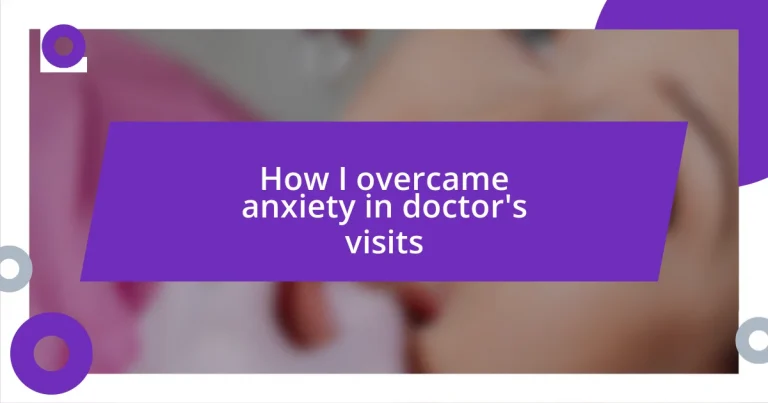Key takeaways:
- Understanding personal anxiety triggers, such as environment and anticipatory anxiety, is crucial for managing anxiety during doctor’s visits.
- Preparation techniques, including jotting down symptoms and questions, practicing deep breathing, and bringing support, can significantly alleviate anxiety before appointments.
- Open communication with healthcare providers and seeking professional help fosters a supportive environment, enhancing overall experience and confidence in managing health concerns.
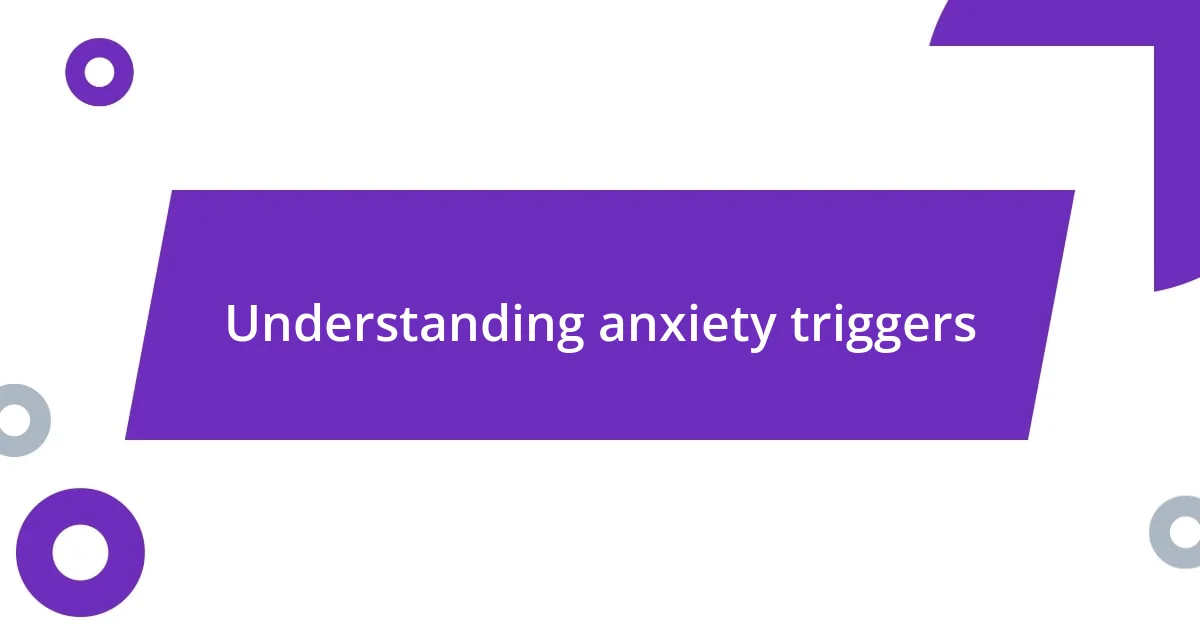
Understanding anxiety triggers
Anxiety triggers can often surprise us. For instance, I remember walking into the waiting room and feeling my heart race as soon as I caught a whiff of antiseptic. It wasn’t just the smell; it reminded me of a past visit where I received alarming news. Isn’t it fascinating how our senses can evoke such vivid memories and emotions?
I’ve learned that certain environments heighten my anxiety, especially those filled with strangers. The more people in the room, the more I feel like I’m being scrutinized. Have you ever noticed how a simple glance or a whispered conversation can send our minds into a frenzy? That’s the power of anxiety—it’s often fueled by the fear of judgment or the unknown.
Then there’s the uncertainty of the actual consultation that can be a huge trigger. I remember sitting in the examination room, mind racing with concerns about what the doctor might say. What if the results were bad? This anticipatory anxiety can create a cycle of worry that makes the wait feel unbearable. Understanding these triggers is the first step in finding ways to manage and overcome them.

Preparing for the doctor’s visit
Preparing for a doctor’s visit isn’t just about getting the right paperwork; it’s also about mentally gearing up for what’s ahead. I remember the countless times I went unprepared, only to leave feeling even more anxious. I found that taking a little time to get ready made all the difference. Jotting down my concerns or questions beforehand helped focus my thoughts and made me feel grounded.
Here are some strategies that I’ve found helpful in preparing for those visits:
– Write down your symptoms: It’s easy to forget exactly what’s been bothering you when you step into that sterile environment.
– List your questions: Having specific questions ready keeps the consultation on track.
– Bring a supportive friend or family member: Sometimes, just having someone there can ease the tension.
– Practice deep breathing: These simple techniques helped calm me down before I entered the office.
– Visualize a positive outcome: Focusing on a hopeful scenario helps shift my mindset and reduce anxiety.
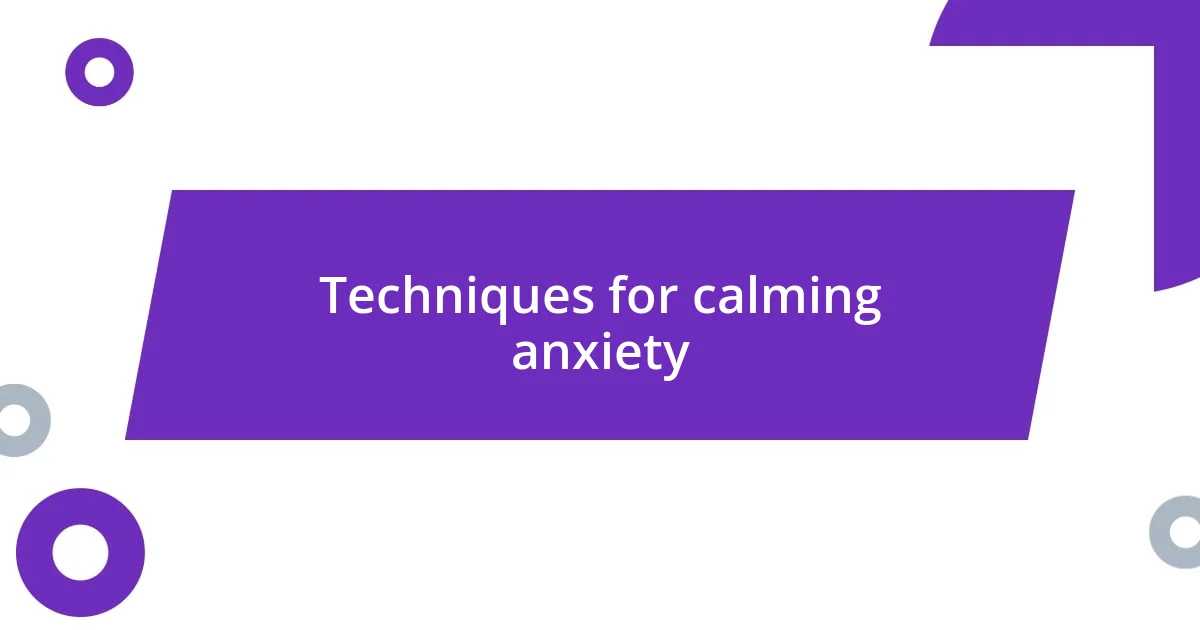
Techniques for calming anxiety
When it comes to calming anxiety, I’ve discovered that breathing techniques make a substantial difference. I remember sitting in the waiting room, and as the anxious thoughts began to swirl, I focused on my breath. Inhaling deeply through my nose, holding for a moment, and then exhaling slowly through my mouth helped ground me. It’s amazing how something as simple as paying attention to my breathing can calm the chaos in my mind.
Another effective technique I often use is visualization. I visualize a serene place, like a quiet beach or a peaceful garden. By picturing myself there, I transport my mind away from the clinical surroundings. This mental escape helps ease the tension I feel. Have you tried creating your own happy place in your mind? Believe me, it works wonders to bring a sense of peace during those anxious moments.
Mindfulness can also be a powerful ally. I take a moment to notice my surroundings—the colors of the walls, the sounds of distant voices, and even the texture of the chair I’m sitting on. Bringing my attention to the present moment helps me detach from anxious thoughts about the future. By acknowledging these sensations, I remind myself that I am safe in that moment. Each of these techniques has played a role in transforming my anxiety into a more manageable experience during doctor visits.
| Technique | Description |
|---|---|
| Breathing Techniques | Focusing on deep breathing to calm the mind and body. |
| Visualization | Imagining a peaceful place to distract from the anxiety of the moment. |
| Mindfulness | Focusing on present sensations to reduce anxious thoughts about the future. |
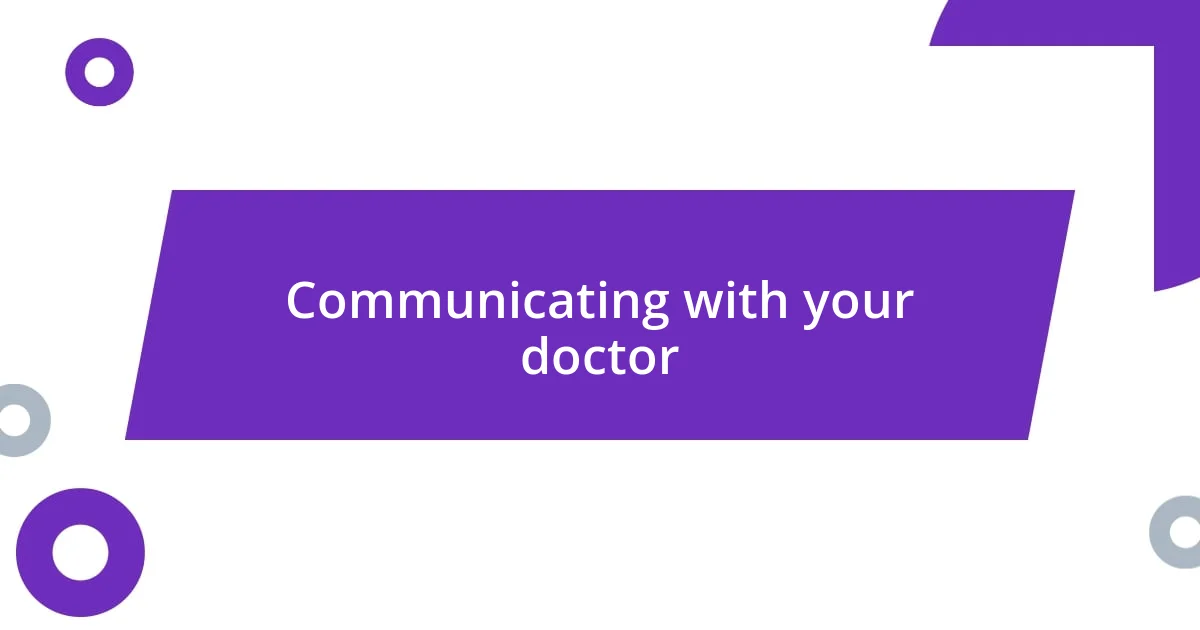
Communicating with your doctor
Open communication with your doctor has been a game changer for me. I remember the times I hesitated to voice my concerns, fearing judgment or misunderstanding. It’s essential to realize that doctors are there to help, and being honest about your feelings can lead to better care. When I finally brought up my anxiety directly, I was surprised by how receptive my doctor was. Have you ever felt that relief when your concerns are validated? It’s as if a weight has been lifted.
During my visits, I now prioritize expressing what I’m feeling clearly and directly. I share not just my symptoms, but also the emotions swirling around them. For instance, telling my doctor, “I’m feeling really overwhelmed about this appointment,” opens up a more profound dialogue. I actively engage in the discussion rather than just answering questions. It’s empowering to see how this two-way communication fosters a collaborative environment, making me feel like I’m part of my own care.
Taking notes during the visit also has made a significant difference. After discussing my concerns, I write down key points and recommendations. This process not only solidifies my understanding but also gives me a tangible item to refer back to later. I hope you consider doing the same; it’s such a simple yet effective way to bridge the communication gap. Have you tried this approach? I find it helps calm any lingering anxiety about forgetting important details.
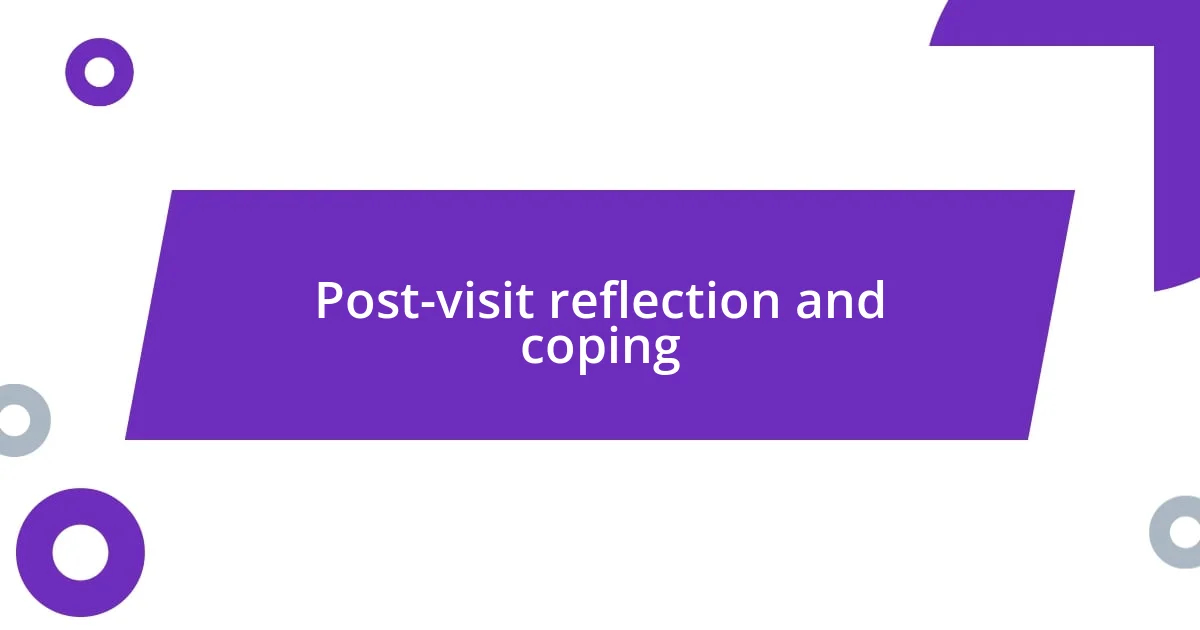
Post-visit reflection and coping
Reflecting on my visits afterward often helps me gain clarity. I set aside some quiet time, perhaps over a cup of tea, to process what happened. This simple act of reflection enables me to acknowledge my feelings—whether they were moments of anxiety or relief—allowing me to understand my emotional journey better. When was the last time you took a moment to reflect after a challenging situation? It can really help put things into perspective.
I also find it beneficial to jot down my thoughts and feelings in a journal. Writing about my experiences serves as an emotional release, almost like a conversation with myself. I note what techniques worked well and what didn’t. This practice not only validates my experiences but helps me track my growth over time. Have you ever considered keeping a journal for your health experiences? I can assure you that it brings a sense of control to the often overwhelming aspect of medical visits.
Coping strategies don’t stop after leaving the doctor’s office. I like to engage in self-care activities afterward, such as going for a walk or indulging in a favorite hobby. These small actions remind me that taking care of my mental health is just as important as physical health. Have you found activities that ground you after a stressful event? It’s incredible how a bit of nurturing can restore your sense of balance and help carry you through the anxieties of future visits.
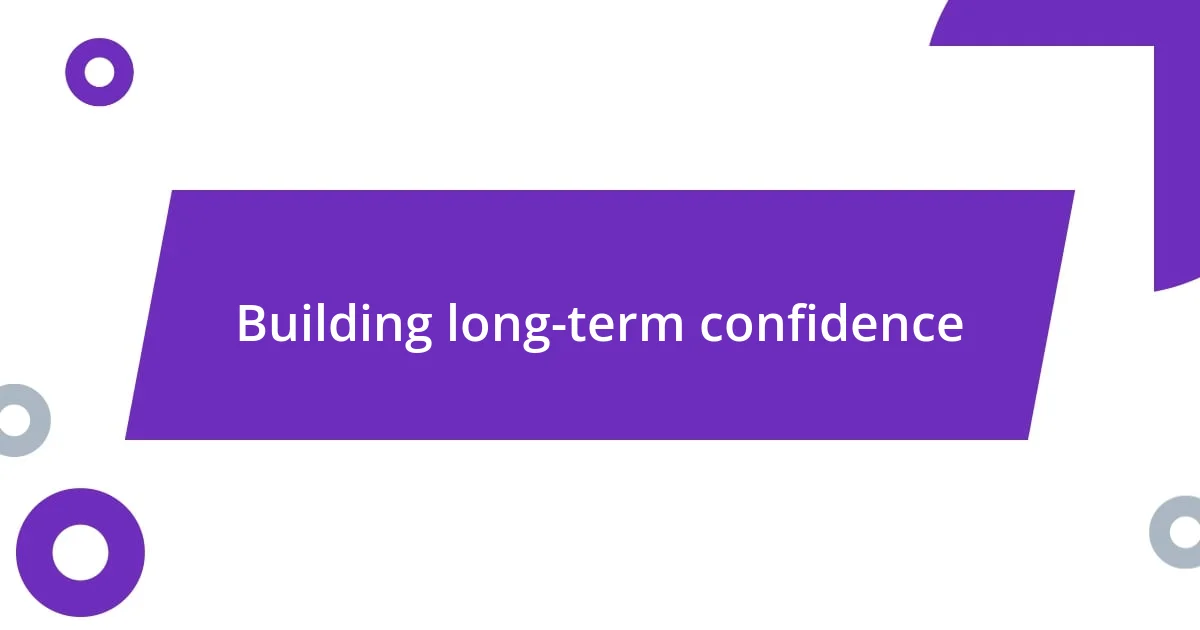
Building long-term confidence
Building long-term confidence in handling doctor’s visits is a gradual process, one that requires patience and deliberate effort. I recall my first few visits where I felt paralyzed by anxiety, but as I accepted these feelings without judgment, I noticed a shift. Instead of viewing the appointments as daunting tasks, I began to see them as opportunities to advocate for my health. How liberating would it feel to reframe your perspective in this way?
Establishing a relationship with my healthcare provider was a pivotal moment in building this confidence. I remember my doctor noting how encouraging it was to see me returning for follow-ups with a more open demeanor. This mutual understanding has fostered trust, allowing me to feel secure in expressing my worries, which has improved my overall experience. Have you ever thought about how a strong patient-provider relationship could change your approach to healthcare?
Over time, I’ve also tapped into the power of preparation. Before each visit, I write down my questions and rehearse what I want to say. There’s a certain comfort in knowing that I’m ready to navigate the conversation, which reduces anxiety significantly. I distinctly remember one appointment where I confidently initiated a discussion about a new concern I had—that breakthrough was monumental for me. It’s amazing how taking these small steps can result in significant long-term gains in confidence. What steps might you take to prepare for your next appointment?
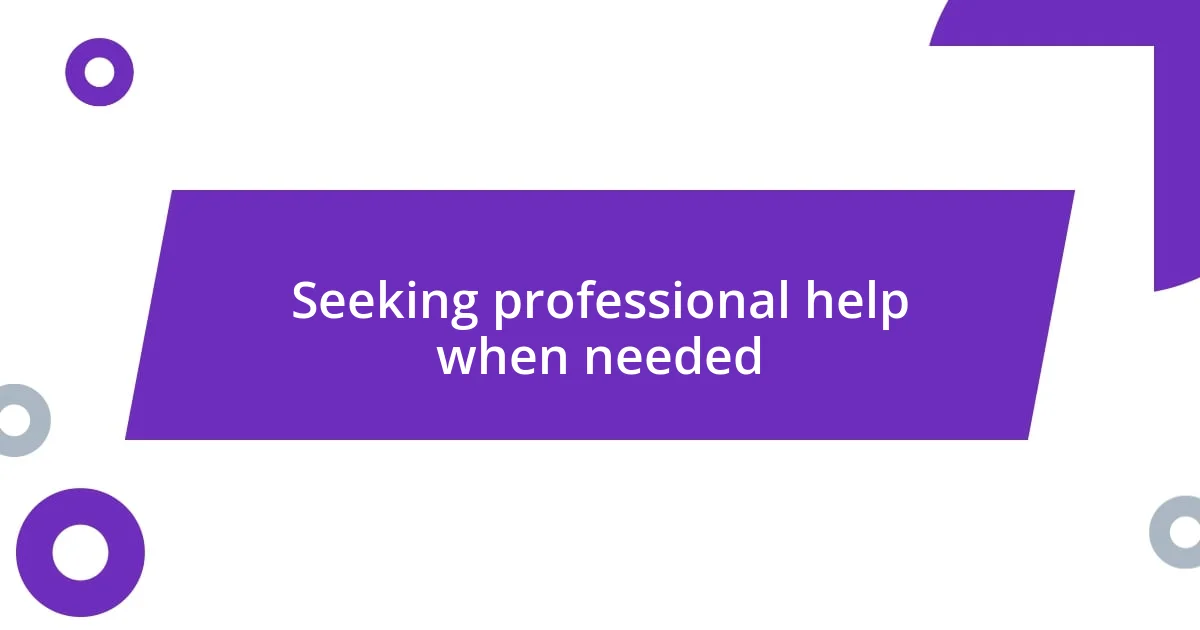
Seeking professional help when needed
Seeking professional help can feel like a big step, especially when grappling with anxiety during doctor’s visits. I remember a time when I finally decided to speak with a therapist about my fears. It surprised me how much better I felt after just a few sessions, as they helped me untangle the thoughts that held me back. Have you ever considered that sharing your concerns with a professional could turn your experience around?
In my journey, I found that acknowledging my anxiety and seeking guidance created a sense of relief, almost like pulling off a tight bandage. My therapist taught me techniques to manage anxiety, such as deep breathing exercises and visualization. I recall practicing these techniques before my next appointment, and to my surprise, they genuinely helped me feel more grounded. Could it be that the tools we need are just a conversation away?
The power of professional support extends beyond just skills; it also offers a safe space to express vulnerabilities. I distinctly remember sharing my feelings of inadequacy and doubt about my health with my therapist. Their understanding made me realize that I wasn’t alone in my struggles—many people face similar challenges with medical visits. This realization created a sense of community for me, fostering a commitment to seeking help when necessary. Have you thought about how powerful it can be to connect with someone who understands your journey?












